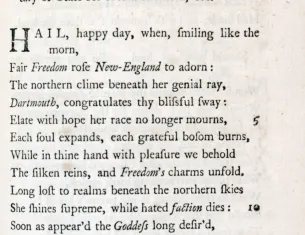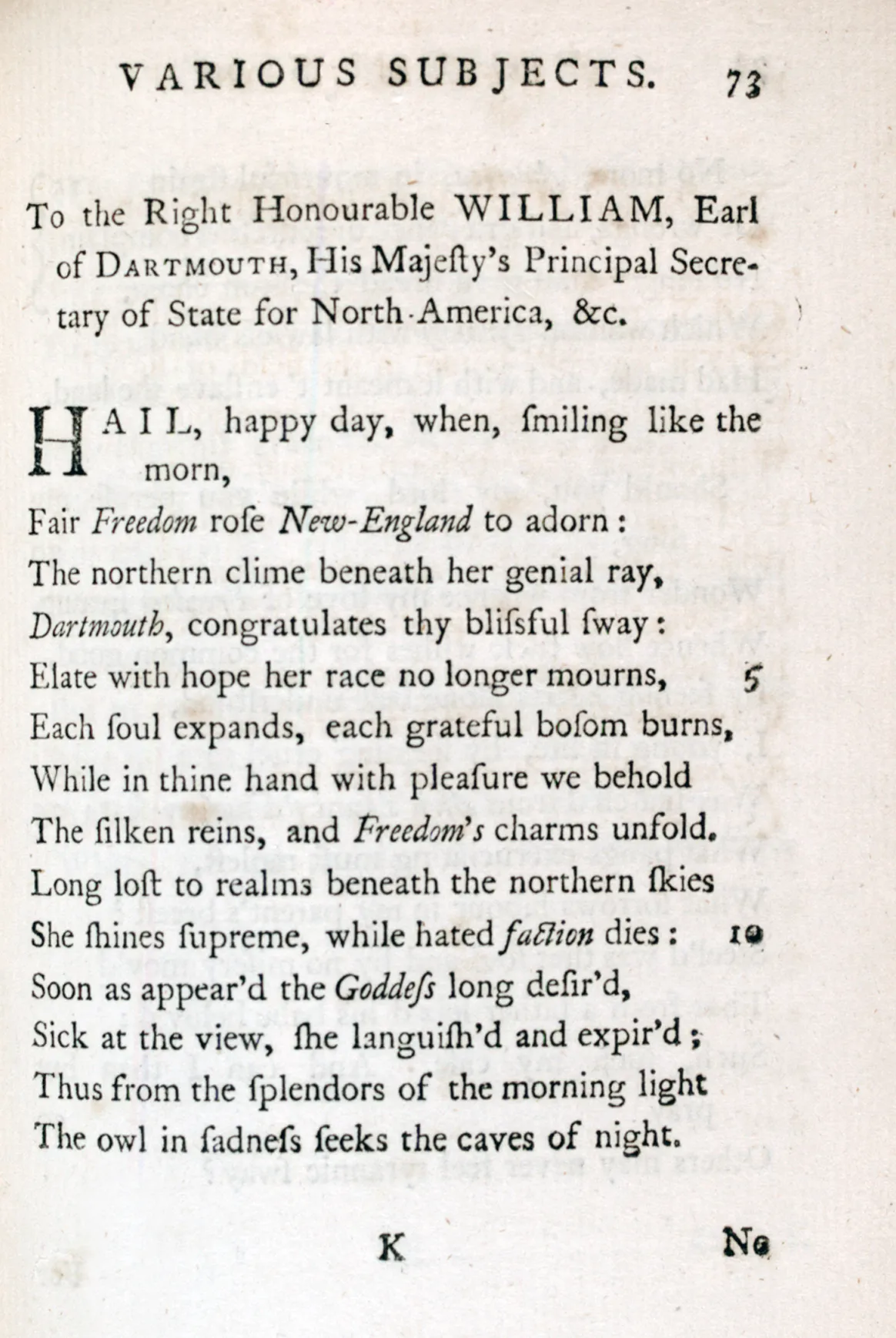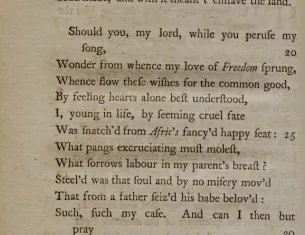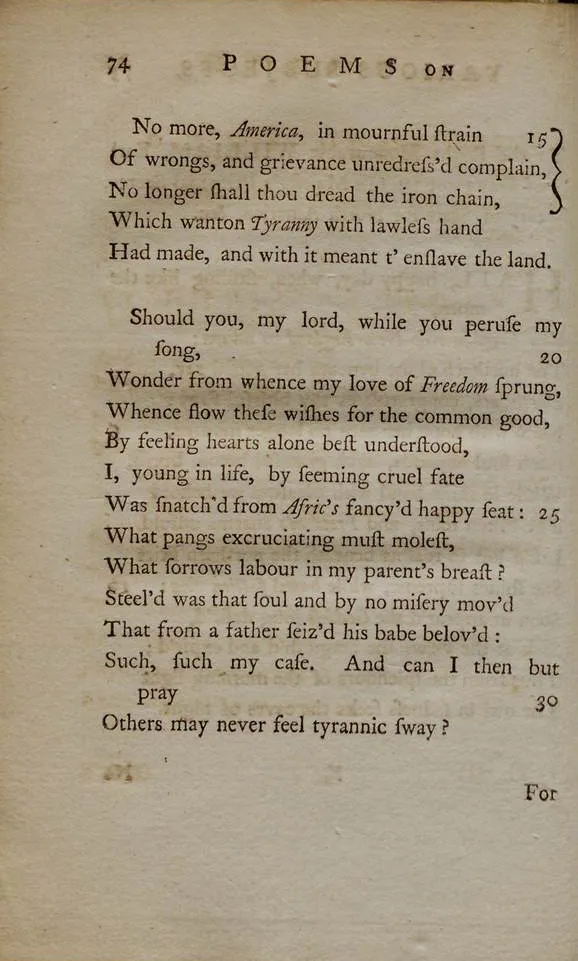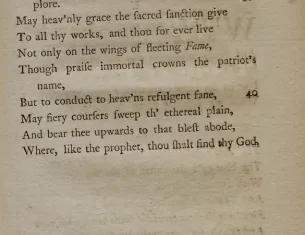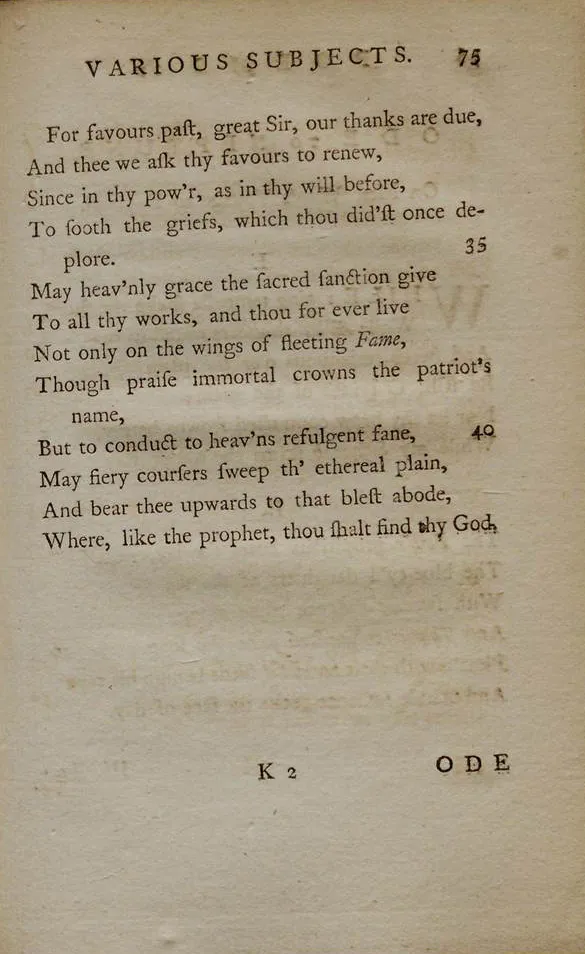Phillis Wheatley’s Poem on Tyranny and Slavery, 1772
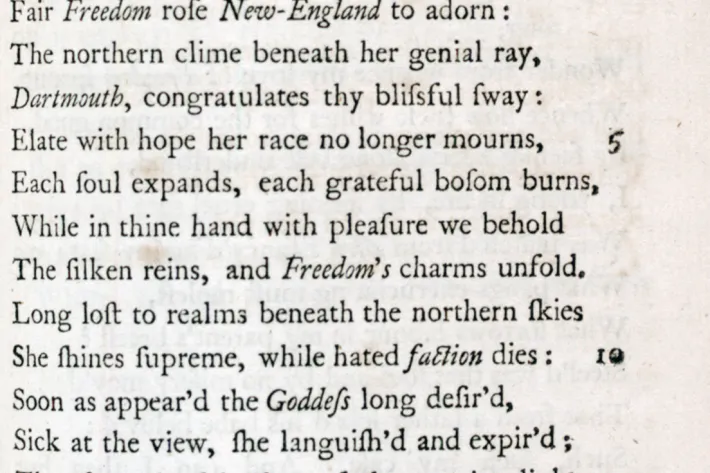
“To the Right Honourable William, Earl of Dartmouth,” by Phillis Wheatley, in Poems on Various Subjects, Religious and Moral, London, 1773 (The Gilder Lehrman Institute of American History)
Born in Africa, Phillis Wheatley was captured and sold into slavery as a child. She was purchased by John Wheatley of Boston in 1761. The Wheatleys soon recognized Phillis’s intelligence and taught her to read and write. She became well known locally for her poetry. Through the Wheatley family, Phillis came into contact with many prominent figures.
In October 1772, Thomas Woolridge, a British businessman, asked her to write a poem for William Legge, the Earl of Dartmouth, who had just been appointed secretary of state for the colonies. Entitled “To the Right Honourable William, Earl of Dartmouth,” the poem reflects the colonists’ hopes that Dartmouth would be less tyrannical than his predecessor. Wheatley then declares that her love of freedom comes from being a slave and describes being kidnapped from her parents, comparing the colonies’ relationship with England to a slave’s relationship with a slave holder. This poem was printed in her book, Poems on Various Subjects, Religious and Moral, published in London in 1773. With this book’s appearance, Wheatley became the first English-speaking person of African descent to publish a book.
Phillis Wheatley, “To the Right Honourable William, Earl of Dartmouth,” 1772
To the Right Honourable WILLIAM, Earl of DARTMOUTH, His Majesty’s Principal Secretary of State for North-America, &c.
HAIL, happy day, when, smiling like the morn,
Fair Freedom rose New-England to adorn:
The northern clime beneath her genial ray,
Dartmouth, congratulates thy blissful sway:
Elate with hope her race no longer mourns,
Each Soul expands, each grateful bosom burns,
While in thine hand with pleasure we behold
The silken reins, and Freedom’s charms unfold.
Long lost to realms beneath the northern skies
She shines supreme, while hated faction dies:
Soon as appear’d the Goddess long desir’d,
Sick at the view, she languish’d and expir’d;
Thus from the splendors of the morning light
The owl in sadness seeks the caves of night.
No more, America, in mournful strain
Of wrongs, and grievance unredress’d complain,
No longer shall thou dread the iron chain,
Which Wanton Tyranny with lawless hand
Had made, and with it meant t’ enslave the land.
Should you, my lord, while you peruse my song,
Wonder from whence my love of Freedom sprung,
Whence flow these wishes for the common good,
By feeling hearts alone best understood,
I, young in life, by seeming cruel fate
Was snatch’d from Afric’s fancy’d happy seat:
What pangs excruciating must molest,
What sorrows labour in my parent’s breast?
Steel’d was that soul and by no misery mov’d
That from a father seiz’d his babe belov’d:
Such, such my case. And can I then but pray
Others may never feel tyrannic sway?
For favors past, great Sir, our thanks are due,
And thee we ask thy favors to renew,
Since in thy pow’r, as in they will before,
To sooth the griefs, which thou did’st once deplore.
May heav’nly grace the sacred sanction give
To all thy works, and thou for ever live
Not only on the wings of fleeting Fame,
Though praise immortal crowns the patriot’s name,
But to conduct to heav’ns resulgent sane,
May fiery coursers sweep th’ ethereal plain,
And bear thee upwards to that blest abode,
Where, like the prophet, thou shalt find they God.
Document Source: The Gilder Lehrman Institute of American History, To view full document go to: https://books.google.com/books?id=KLFBAAAAYAAJ&dq=phillis%20wheatley%20poems&pg=PA1#v=onepage&q=phillis%20wheatley%20poems&f=false
Background
Born in Africa, Phillis Wheatley was captured and sold into slavery as a child. She was purchased by John Wheatley of Boston in 1761. The Wheatleys soon recognized Phillis’s intelligence and taught her to read and write. She became well known locally for her poetry. Through the Wheatley family, Phillis came into contact with many prominent figures.
In October 1772, Thomas Woolridge, a British businessman, asked her to write a poem for William Legge, the Earl of Dartmouth, who had just been appointed secretary of state for the colonies. Entitled “To the Right Honourable William, Earl of Dartmouth,” the poem reflects the colonists’ hopes that Dartmouth would be less tyrannical than his predecessor. Wheatley then declares that her love of freedom comes from being a slave and describes being kidnapped from her parents, comparing the colonies’ relationship with England to a slave’s relationship with a slave holder. This poem was printed in her book, Poems on Various Subjects, Religious and Moral, published in London in 1773. With this book’s appearance, Wheatley became the first English-speaking person of African descent to publish a book.
Transcript
Phillis Wheatley, “To the Right Honourable William, Earl of Dartmouth,” 1772
To the Right Honourable WILLIAM, Earl of DARTMOUTH, His Majesty’s Principal Secretary of State for North-America, &c.
HAIL, happy day, when, smiling like the morn,
Fair Freedom rose New-England to adorn:
The northern clime beneath her genial ray,
Dartmouth, congratulates thy blissful sway:
Elate with hope her race no longer mourns,
Each Soul expands, each grateful bosom burns,
While in thine hand with pleasure we behold
The silken reins, and Freedom’s charms unfold.
Long lost to realms beneath the northern skies
She shines supreme, while hated faction dies:
Soon as appear’d the Goddess long desir’d,
Sick at the view, she languish’d and expir’d;
Thus from the splendors of the morning light
The owl in sadness seeks the caves of night.
No more, America, in mournful strain
Of wrongs, and grievance unredress’d complain,
No longer shall thou dread the iron chain,
Which Wanton Tyranny with lawless hand
Had made, and with it meant t’ enslave the land.
Should you, my lord, while you peruse my song,
Wonder from whence my love of Freedom sprung,
Whence flow these wishes for the common good,
By feeling hearts alone best understood,
I, young in life, by seeming cruel fate
Was snatch’d from Afric’s fancy’d happy seat:
What pangs excruciating must molest,
What sorrows labour in my parent’s breast?
Steel’d was that soul and by no misery mov’d
That from a father seiz’d his babe belov’d:
Such, such my case. And can I then but pray
Others may never feel tyrannic sway?
For favors past, great Sir, our thanks are due,
And thee we ask thy favors to renew,
Since in thy pow’r, as in they will before,
To sooth the griefs, which thou did’st once deplore.
May heav’nly grace the sacred sanction give
To all thy works, and thou for ever live
Not only on the wings of fleeting Fame,
Though praise immortal crowns the patriot’s name,
But to conduct to heav’ns resulgent sane,
May fiery coursers sweep th’ ethereal plain,
And bear thee upwards to that blest abode,
Where, like the prophet, thou shalt find they God.
Document Source: The Gilder Lehrman Institute of American History, To view full document go to: https://books.google.com/books?id=KLFBAAAAYAAJ&dq=phillis%20wheatley%20poems&pg=PA1#v=onepage&q=phillis%20wheatley%20poems&f=false
